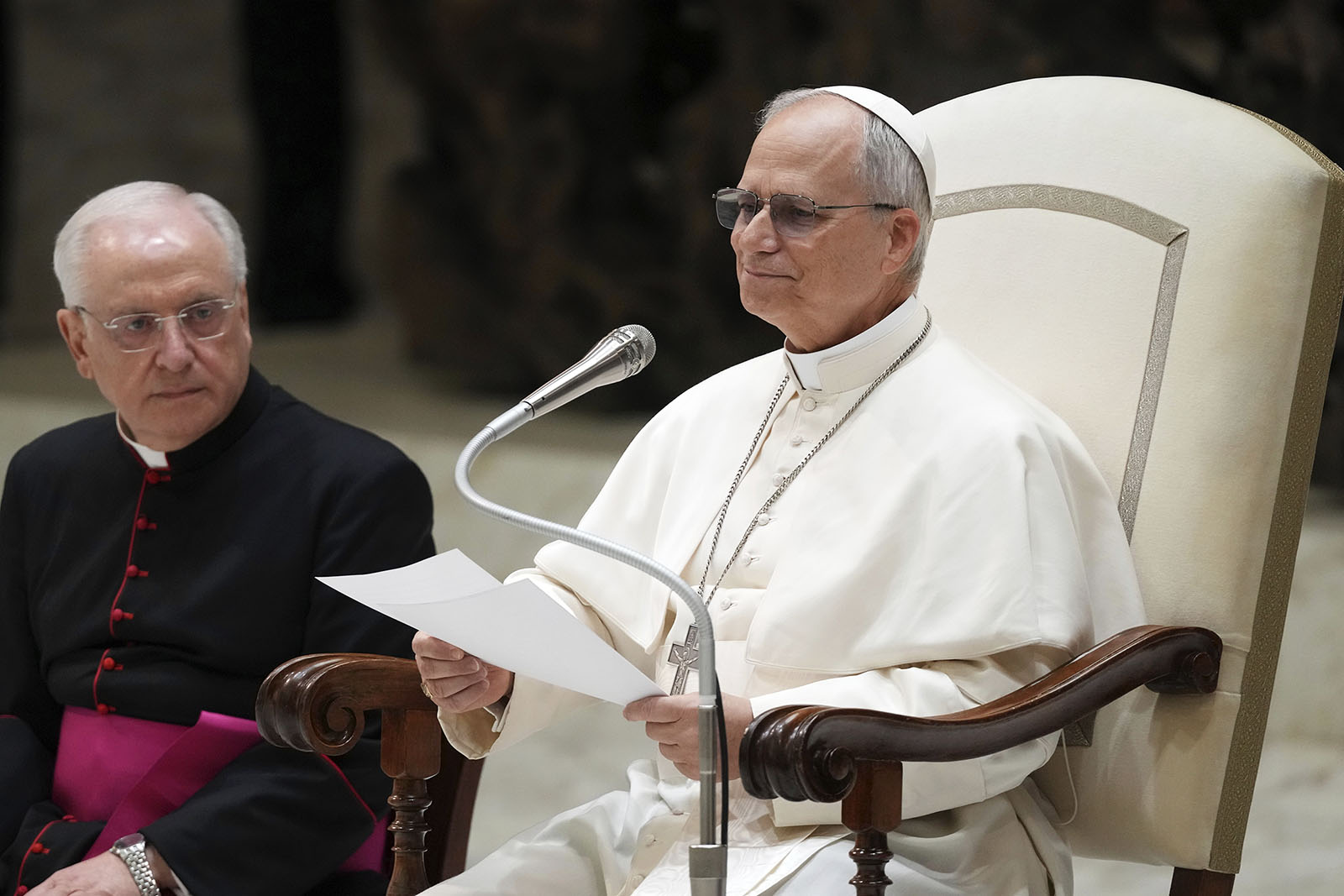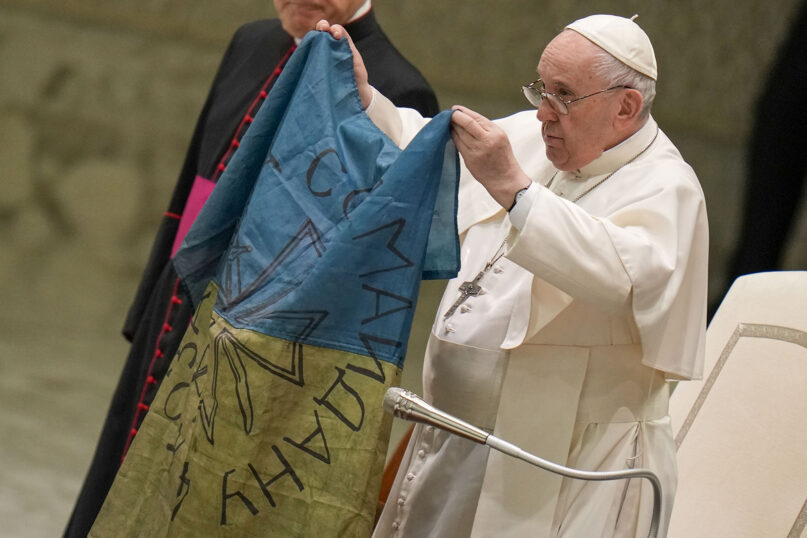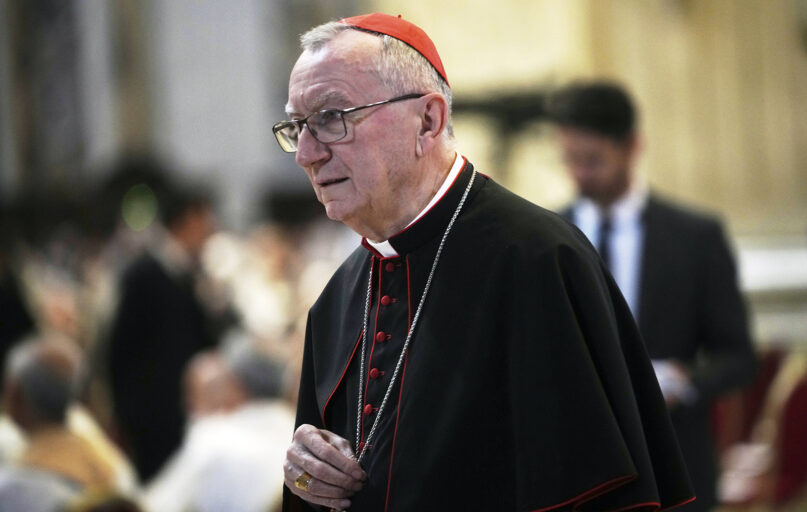
VATICAN CITY (RNS) – Before becoming Pope Leo XIV Cardinal Robert Prevost denounced Russia’s “imperialist invasion” of Ukraine, in a 2022 interview, saying Russia was seeking to conquer a territory for its own advantage.
“It’s already been proven that crimes against humanity are being committed in Ukraine,” he told the weekly Semanario Expresion in 2022 when he was still bishop of the Diocese of Chiclayo, Peru. “I ask God for peace, but I believe that we need to be clearer, including some politicians in our countries who don’t want to recognize the horrors of the war and wickedness that Russia is realizing in all its activities in Ukraine.”
If Leo maintains this position on Russia’s actions in Ukraine, his papacy could signify a shift in how the Vatican’s diplomatic branch addresses the ongoing conflict.
While recognizing that the newly elected pope used “strong words” in the past regarding the conflict in Ukraine, Cardinal Pietro Parolin, who oversees the Vatican’s foreign relations as secretary of state, told RNS he doesn’t think that will hinder the Vatican’s mediation efforts.
“The Russian side also appreciates the position of the Holy See, a position that tries to bring the parties together instead of creating further divisions,” he said.
Parolin, who was considered a front-runner in the conclave that elected Pope Leo XIV, was a top aide in Pope Francis’ efforts to promote peace between Russia and Ukraine. The Argentine pope upheld a historically common Vatican approach of diplomacy in not condemning political leaders or countries, in order to maintain a neutral position that might favor peace negotiations.
Francis was hesitant in condemning Russia publicly and when the war started in 2022, he broke protocol by driving to the Russian Embassy to the Holy See. Speaking to the Italian newspaper Corriere della Sera in May 2022, Francis said “NATO barking at Russia’s doors” might have provoked the invasion of Ukraine, and in an interview with Swiss broadcaster RSI in 2024, as the war continued to ravage the country, he encouraged Ukrainian leaders to have “the courage of the white flag.”
Despite repeated invitations, Pope Francis never visited Ukraine during the conflict, but he sent his closest collaborators to offer support and aid. In May 2023, he tapped the head of the Italian bishops and an experienced peace mediator, Cardinal Matteo Zuppi, to head the Vatican’s peace efforts by meeting world leaders in Ukraine, China, Russia and the United States.

Pope Francis shows a flag that was brought to him from Bucha, Ukraine, during his weekly general audience in the Paul VI Hall, at the Vatican, April 6, 2022. (AP Photo/Alessandra Tarantino)
“Francis’ positions unfortunately led to many misunderstandings. The perception of impartiality between Russia and Ukraine was considered unjust,” said Massimo Franco, an Italian journalist and author of the “Parallel Empires: The Vatican and the United States — Two centuries of alliance and conflict.”
“Today the Holy See can have a more decisive role because Putin’s resistance to seeking a real peace is increasingly clear and Leo XIV used clearer words toward Russia,” Franco added.
According to Franco, the new pope’s strong take on Russia might be “a tool to increase pressure on Moscow.”
Immediately after his election on May 11, the Chicago-born Pope Leo XIV made an appeal for “a disarming and disarmed peace” and called for the release of prisoners and the return of deported children, a recurring theme of the negotiations between Russia and Ukraine.
Ukrainian President Volodymyr Zelenskyy called Pope Leo XIV on Monday (May 12), and during what he described on X as a “warm and truly substantial” conversation, invited the new pope to visit Kyiv. He also wrote that Ukraine “deeply appreciates the Holy See’s coherent position” on the conflict, voicing his hope that the Vatican will continue its support for “restoring justice and achieve a lasting peace.”
I spoke with Pope Leo XIV. It was our first conversation, but already a very warm and truly substantive one.
I thanked His Holiness for his support of Ukraine and all our people. We deeply value his words about the need to achieve a just and lasting peace for our country and the… pic.twitter.com/4ocbA7jnMK
— Volodymyr Zelenskyy / Володимир Зеленський (@ZelenskyyUa) May 12, 2025
President Vladimir Putin also issued a statement after Pope Leo XIV’s election, voicing hope that relations between the largest country in the world and the small Catholic nation continue “based in the Christian values that unite us.”
Parolin said that “the pope will renew, as he has already done since the beginning of his pontificate, the appeal for the end of the war,” speaking to journalists before entering a conference titled “Toward a theology of hope for and from Ukraine,” organized by the Pontifical Gregorian University and the University of Notre Dame in Rome on Wednesday (May 14).
“We always remain available to offer a space, talking about mediation is excessive, but at least we can facilitate the encounter,” he added.

Cardinal Pietro Parolin arrives in St. Peter’s Basilica to attend a Mass of mourning for late Pope Francis, at the Vatican, Saturday, May 3, 2025. (AP Photo/Alessandra Tarantino)
St. Peter’s Basilica at the Vatican became a hopeful ground for peace when U.S. President Donald Trump and Zelenskyy sat face to face during Pope Francis’ funeral on April 26. But achieving peace in Ukraine has continued to be elusive, especially since both Putin and Trump decided not to attend mediations in Istanbul this Friday.
The pope’s inauguration ceremony, to be held Sunday in St. Peter’s Square at the Vatican, will offer another opportunity for Zelenskyy to meet U.S. leaders, this time Vice President JD Vance and Secretary of State Marco Rubio.
“I don’t see Leo XIV embracing Trump’s foreign policy, but a desire to grasp those aspects that can coincide with the Holy See’s peace strategy,” Franco said. While it’s clear that Trump and the pope don’t see eye to eye on some issues, especially migration, “neither one wants a head-on clash, unless it’s inevitable,” Franco added.
Traditionally, the Holy See has relied on its relations with local churches in Ukraine and Russia to settle conflict. Pope Francis held a historic meeting with the Patriarch of Moscow, Kirill, in Havana in 2016 and continued that relationship throughout his pontificate. Kirill has been an ally of Putin, offering religious justifications for the war in Ukraine. In a message to Pope Leo XIV, Kirill called for a continued effort to promote relations between the two churches.
Leo XIV met with the Primate of the Greek Catholic Church in Kyiv, Archbishop Sviatoslav Shevchuk, to roaring applause from the crowd, during a meeting at the Vatican for the Jubilee of Eastern Churches on Wednesday.
“I will make every effort so that this peace may prevail. The Holy See is always ready to help bring enemies together, face to face, to talk to one another, so that peoples everywhere may once more find hope and recover the dignity they deserve, the dignity of peace. The peoples of our world desire peace, and to their leaders I appeal with all my heart: Let us meet, let us talk, let us negotiate! War is never inevitable,” Leo said at the ecumenical event.
War is never inevitable. Weapons can and must fall silent, for they never solve problems but only intensify them. Those who sow peace will endure throughout history, not those who reap victims. Others are not enemies to hate but human beings with whom to speak.
— Pope Leo XIV (@Pontifex) May 14, 2025
Shevchuk had praised the new pope as “an announcer of peace,” in a message after his election.
On Thursday, Leo met with Shevchuk at the Vatican in one of his first private audiences as pope. Although the Vatican did not release a statement after the meeting, Shevchuk said he presented the pope with a list of prisoners held by Russia, according to a report from the Associated Press.
During the conference at the Gregorian University in Rome on Wednesday, Parolin underlined the need for Christians to “help people to not give in to hate, vengeance and desperation” because “reconciliation is possible only where there is truth and forgiveness.”
The Ecumenical Orthodox Patriarch Bartholomew — who recognized the Independence of the Orthodox Church in Ukraine in 2019, severing ties with the Orthodox Church in Moscow — praised Leo XIV’s election as the start of “a new era.” He said he will attend the pope’s inauguration ceremony and “propose developing dialogue between East and West.”
With major superpowers at play and religious tensions still unresolved, Pope Leo XIV faces a hard road ahead in advocating for peace in Ukraine and beyond. While he inherits a complex legacy and the well-oiled diplomacy of the Holy See, it will be his style and leadership that will determine what – if any – role the Vatican will play in the negotiations.
